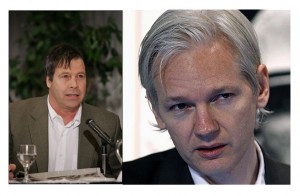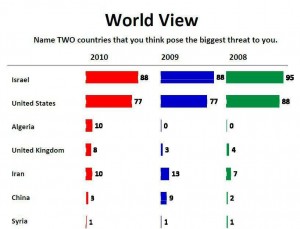Reading the news this week, there are at least three (not unrelated) subjects that call to mind that great line from Adventureland: “Hey, do you have an ice-pick I can jam into my ears? I can’t listen to this song again.”
- Liberals crowing (um, prematurely?) about the mighty triumph in Libya. Not surprisingly, you can find the quintessential dumb, media hack version on the Times’ OpEd page. There is an even dumber wonk version in the works — which quite possibly will lead to a new! improved! foreign policy going forward based on “R2P” which involves, you guessed it, more “kinetic military actions”.
- The lack of response, from government and serious media alike, to the Wikileaks revelations about the 2006 atrocity in Ishaqi, in which U.S. soldiers executed 11 civilians, including women and toddlers, by tying their hands behind their backs, and shooting them in the head. And then called in an air strike to destroy the evidence.
- And, to arbitrarily limit the list to three things, the USA’s Qaddafi problem, as laid out in this typically very good piece from Amy Davidson of the New Yorker, who seems to be one of the few voices in the mainstream press paying attention:
Its dealings in Libya are not the C.I.A.’s only problem; nor is the C.I.A. the only problem. The Washington Post has two new pieces in its “Top Secret America” series that one should read. The first, by Julie Tate and Greg Miller, is on the C.I.A.’s shift away from learning things and toward killing people considered dangerous (and who makes that call?), with analysts becoming “targeters.” The other, by Dana Priest and William Arkin, is about the Pentagon’s Joint Special Operations Command, which has held some thousand prisoners “in jails that it alone controls in Iraq and Afghanistan.” (“We’re the dark matter. We’re the force that orders the universe but can’t be seen,” a SEAL told the Post.) The “C.I.A.” binder in Tripoli included “a list of 89 questions for the Libyans to ask a suspect,” the Times said. We should have at least that many—many more—for our own government.
Maybe minor, maybe not, but Davidson cites the “dark matter” quote, not what followed. The attribution itself is kind of revealing, no? It was not “a SEAL told the Post.” No, that creepy, grandiose claim came from “a strapping Navy SEAL, speaking on the condition of anonymity.” Yes, strapping. Really?
To be sure, Priest and Arkin are not the only reporters in the land to have become aroused by contact with these hunky dudes.
The humble brag about being “dark matter,” the ever-expanding practice of extrajudicial assassination–something even Reagan condemned– on an unimaginable (and apparently unknowable) scale. The CIA quietly and without discussion transforming its mission from intelligence to becoming “one hell of a killing machine.” Working in close coordination with the very dictators we’re demonizing for the rubes at home…. That’s bad, I guess, but…. Hey, did you check out the six-packs on these dudes!



